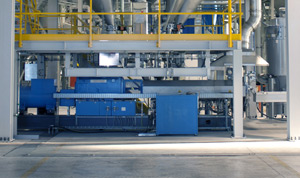COPERION
Iberia's first biodegradable polymer compounding plant begins production in Portugal's Porto de Mós
 Coperion’s biodegradable polymers production unit was installed in a three-storey steel framework at the Cabopol facility (Photo: Coperion) |
Portuguese compounding company Cabopol (Porto de Mós; www.cabopol.com) has begun production of biodegradable polymers at its Porto de Mós facility. The plant is believed to be the first compounding unit for biodegradable plastics on the Iberian Peninsula. Compounding systems specialist Coperion (Stuttgart / Germany; www.coperion.com) was responsible for providing technology for the plant, which includes materials handling for all raw materials – storage, conveying, weighing and dosing – as well as compounding with downstream pelletising and drying.
Biodegradable compounds based on compostable polyesters with and without starch are being produced at the unit. Coperion said the materials supply system is highly flexible, allowing the addition of several different components, while the processing extruder, a “ZSK megacompounder plus”, has a twin screw side feeder and a venting unit. The die discharges into a water bath for strand cooling, followed by suction drying of the strand surface prior to pelletising.
The compounds are sold by Cabopol under the “Biomind” brand and are used in non-durable products for household, industrial and agricultural applications such as disposable nappies and cutlery, rubbish bags, food packaging, shopping bags, drinking straws and agricultural films.
Biodegradable compounds based on compostable polyesters with and without starch are being produced at the unit. Coperion said the materials supply system is highly flexible, allowing the addition of several different components, while the processing extruder, a “ZSK megacompounder plus”, has a twin screw side feeder and a venting unit. The die discharges into a water bath for strand cooling, followed by suction drying of the strand surface prior to pelletising.
The compounds are sold by Cabopol under the “Biomind” brand and are used in non-durable products for household, industrial and agricultural applications such as disposable nappies and cutlery, rubbish bags, food packaging, shopping bags, drinking straws and agricultural films.
21.09.2010 Plasteurope.com [217319]
Published on 21.09.2010

 German version of this article...
German version of this article...